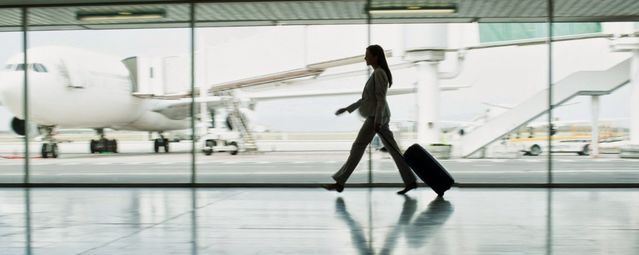
Sleep
How to Stay Healthy and Sane with an Insane Travel Schedule
Lessons from the road.
Posted June 20, 2018

Anyone who regularly travels for business knows that these trips can take a toll. But a recent study suggests that it’s worse than we thought. Even more than just wear and tear, frequent business travel (defined as more than two weeks a month) has been linked to higher levels of obesity, depression, and other health problems.
As a CEO of a growth stage company, I am on an airplane more often than in my office. In fact, I recently calculated that I travel about 200 days a year. This frequent travel is exciting, as it represents meetings with our customers and speaking engagements at events where we talk about how critical cognition is to overall health.
Unfortunately, it also represents a disruption to the routine of diet, socialization, sleep, and exercise – all of which I have written about extensively in relationship to cognitive health.
Over the past two years of increasing travel demands, I have found there are a few key lessons and travel behaviors that have helped me stay healthy and sane as my company grows and the demand on my time grows in kind.
1. Do something active every day on the road.
If I have time to get in a lap swim on the road, it is a great day. In fact, I prioritize hotels and locations that make it easy for me to get in my swim while traveling. Yet, too often the days are long, and all I can manage is a 30-minute walk on a treadmill at 5:30am. To stay active and fit, I take the stairs at hotels or office buildings. Even when a meeting is far away from my hotel, I will walk part of it and check out interesting sights in whatever city I happen to be in that day. It takes a little effort, but that effort pays off in lowering my stress levels, maintaining my fitness, and bringing some balance to a busy schedule. Last year in London, I had a meeting at one end of Hyde Park – I had the taxi drop me off at the other end and enjoyed a walk along the Serpentine before my meeting. I arrived feeling energetic and the customer commented on how “flush with sunshine and energy” I looked: not a bad impression.
2. You are what you eat.
Travel can seem like an excuse to throw good nutrition to the wind and eat on the fly. Having celiac disease helps me avoid the sugary and salty snacks from vending machines because they’re usually packed with gluten. But trust me, the pull of fast food is never stronger than when I am away from home and the routine of healthy cooking. To that end, I have fail-safes – things I grab that are easy and healthy. One of my favorites is the Starbucks cheese and apple box, because it’s almost always easy to find (it seems there is a Starbucks on every corner in every city – thank you Howard Schultz!) and it’s healthy and filling. Another fail-safe is a package of edamame and an apple in my bag at all times. I also travel with dark chocolate covered almonds for a mid-day pick me up that feels guilty but is actually pretty healthy. As much as I love to savor local cuisines, I find that simple familiar food is key to keeping balanced and healthy on a multi-week business trip abroad. Finally, I avoid alcohol on travel days and on all my flights. I know, I know, no fun – but the point here is that both alcohol and air travel dehydrate, so I feel better and perform better on the road when I avoid it.
3. Prioritize sleep.
There are multiple aspects to getting a good night sleep. First, I absolutely never-ever have caffeinated drinks after 1 PM. When people say they can sleep well on caffeine I’m skeptical– trust me no one’s brain is that special or different. You might sleep but you won’t sleep as deeply. Second, I limit alcohol. Although a nightcap might help you drift off, it interrupts healthy sleep patterns and results in a less restorative sleep. Third, I turn off all screens at least an hour before my target time to be asleep. When using screens after 6 PM, the “night shift” setting is great for eliminating evening exposure to blue light. Fourth, when it’s time to go to bed, the phone goes into airplane mode, and I turn on white noise – my favorite is ocean waves. The white noise helps to calm the brain’s desire to be active, and it also drowns out unfamiliar hotel noises with a familiar pattern of sound. Finally, it’s well documented that we don’t sleep well the first night in a new place. I try to cheat this by staying in the same hotels and even the same rooms in cities I visit frequently. This means that even when I am 6,000 miles from home, I am in familiar surroundings, and I have found it greatly improves my ability to sleep well when I travel. All of these tips are part of sleep hygiene which represents the best advice on getting a good night sleep from experts around the world.
4. Stay in touch.
It’s hard being away from friends and family so often. Yet for almost every trip I take, I manage to get together with a family member or friend in one of the cities I visit. As I type this on yet another flight, I have worked a dinner in Tokyo into this business trip to catch up with a friend who is also in Japan on business. Last week, I timed the trip to New York for customer and investor meetings to coincide with my nephew’s graduation and popped up to Connecticut for a weekend with family. These dinners and meet ups keep me feeling socially connected and part of my family and network even with a 75% or more travel schedule. It can be tempting to schedule every minute of a trip to maximize value for travel dollars spent. I think that I am a better CEO when I make time for family – from my mom and aunts and uncles to my energetic nieces and nephews, and yes even my in-laws! I schedule these meetings and dinners ahead of time with every bit as much attention to fitting them in as seeing the CEO of a client company.
Putting it all together
Nothing makes travel feel as good as eating a home cooked meal and sleeping in your own bed. Several years of hitting the road have taught me how to stay mentally and physically healthy while also being a road warrior for my growing company. It’s not easy, and my at-home habits help me maintain self-care while traveling. I know I feel much better when I practice good habits even when they seem like a lot of trouble to go to in the moment. For those of us that find ourselves on a plane more often than at the office, it’s critical to form travel habits that support our health and happiness. I hope this article prompts others that travel often to share their tips for the road.

